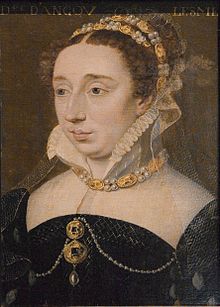Diane de France
Diane de France | |
|---|---|
| suo jure Duchess of Angoulême Duchess of Castro | |
 | |
| Born | 25 July 1538 Paris, Kingdom of France |
| Died | 11 January 1619 (aged 80) Paris, Kingdom of France |
| Noble family | Valois-Angoulême Montmorency (by marriage) |
| Spouse(s) |
|
| Father | Henry II of France |
| Mother | Filippa Duci |
Diane de France, suo jure Duchess of Angoulême (25 July 1538 – 11 January 1619) was the natural (illegitimate) daughter of Henry II, King of France, and his Piedmontese mistress Filippa Duci.[1] Disproven sources claim that she was the daughter of Diane de Poitiers, because the latter was already Henry II's mistress by the time she brought up the little girl under her care.
Diane was born in Paris during 1538 and was formally legitimised in 1547. She was married on 14 February 1552 to Orazio Farnese, Duke of Castro,[2] but was later widowed in 1553 after Orazio was killed in battle at Hesdin.[3] Diane's second marriage was to Francis de Montmorency in 1559,[4] who was the eldest son of Anne, Constable of France. Diane was widowed for a second time in 1579, after helping her to make her husband a leader of the politiques, a moderate Roman Catholic group in France.
Diane became a favourite of Henry III, King of France, who made her Duchess of Angoulême in appanage (during her lifetime only) during 1582. Diane also enjoyed much respect at the court of Henry IV, King of France, and superintended the education of his son Louis XIII. She was known to sing and could play the lute and other musical instruments.[5]
Diane died on 11 January 1619 in Paris. Her surviving letters reveal her as a woman of great courage and tolerance.
References
- ^ Considerations on "Les Amours de I. du Bellay" , Robert V. Merrill, Modern Philology, Vol. 33, No. 2 (Nov., 1935), 133.
- ^ Helge Gamrath, Farnese: Pomp, Power and Politics in Renaissance Italy, (L'Erma di Bretschneider, 2007), 70.
- ^ Kenneth Meyer Setton, The Papacy and the Levant, 1204-1571, Vol. IV, (The American Philosophical Society, 1984), 596.
- ^ Janine M Lanza, From Wives to Widows in Early Modern Paris: Gender, Economy, and Law, (Ashgate Publishing, 2007), 29.
- ^ Jeanice Brooks, Courtly Song in Late Sixteenth-Century France, (University of Chicago Press, 2000), 12.
